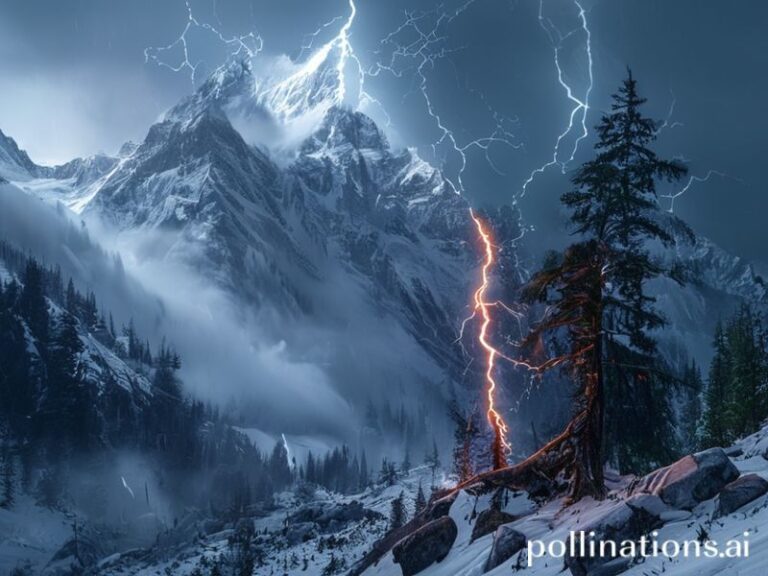Nick Cave: The Global Export of Beautiful Ruin, From Melbourne Dive Bars to UN Climate Talks
Nick Cave: The Global Prophet of Beautiful Ruin
By Our Man in the Cheap Seats, Somewhere Over the Pacific
If you listen closely outside any karaoke bar from Berlin to Bogotá, you can usually catch a tremolo-laden Australian baritone crooning “People just ain’t no good” while the city’s neon lights flicker like bad omens. That voice belongs to Nick Cave, the Melbourne-born, London-hardened, everywhere-acknowledged poet laureate of mankind’s talent for spectacular self-immolation. In an era when nations bicker over tariffs and TikTok dances, Cave’s oeuvre has quietly become the soundtrack to our collective nervous breakdown—proof that the apocalypse sells better when it rhymes.
Cave’s first passport stamp came in 1980 with The Birthday Party, a band that treated post-punk like a Molotov cocktail with a lit cigarette already dangling from its lips. The British press crowned them “the most violent live band in the world,” which in Thatcher-era parlance was high praise. Their shows ended in blood, glass shards, and the sort of existential dread that would later migrate to Eastern European stag parties who still scream “Release the Bats” at 4 a.m. in Kraków. It was, in hindsight, the original Brexit: an Australian export that destroyed venues faster than any trade deal could rebuild them.
After the Birthday Party imploded—because of course it did—Cave reconstituted the Bad Seeds, a rotating rogue’s gallery that now reads like Interpol’s most pretentious mixtape. Blixa Bargeld (Germany), Warren Ellis (Australia), Martyn P. Casey (Mauritius via England), Jim Sclavunos (United States)—all bound by a shared love of Biblical imagery and trench coats. Together they exported gothic Americana back to America, a neat trick akin to selling sand to Saudi Arabia, except the sand is laced with fentanyl and regret. The 1986 album “Your Funeral… My Trial” was banned in South Africa during Apartheid, which, given the regime’s refined palate for atrocity, is rather like being kicked out of Hell for poor taste.
In 2022, the man released “Carnage,” a lockdown collaboration with Ellis that reached No. 1 in Belgium—because if any country understands baroque despair, it’s the one famous for a 589-day government formation crisis. Spotify data now show Cave’s monthly listeners clustering in Scandinavian countries whose suicide rates and social welfare systems exist in inverse proportion, suggesting that existential ballads function as a kind of national antidepressant. Global capitalism’s latest miracle: turning despair into streaming revenue, taxed at 25% in Stockholm.
Meanwhile, Cave’s “Red Hand Files”—an online advice column where he answers fan questions with the tenderness of a priest who’s lost his faith but kept the collar—has become a secular confessional box for the planet’s lonely. A teenager in Manila asks about heartbreak; a pensioner in Patagonia queries the afterlife. Cave responds with the patience of a man who has already watched the world end twice before breakfast. The project has been translated into 15 languages, none of which have a native word for whatever it is we’re all feeling, but all of which recognize the ache.
Of course, no prophet escapes commodification unscathed. Luxury fragrance houses now hawk “Nick Cave-inspired” perfumes promising notes of incense, gunpowder, and old testament. A Berlin start-up offers AI-generated playlists “in the style of Nick Cave,” which is rather like hiring a photocopy to do your crying for you. Cave’s own response: “I’d prefer the robots stick to accounting.” The robots, ever polite, have complied—so far.
As COP28 delegates argue over carbon credits in air-conditioned tents, Cave is midway through a world tour titled “Wild God,” whose carbon footprint is offset by the sheer volume of audience tears. The man himself, now 66, stalks stages from Mexico City to Moscow like a dapper grim reaper who’s read too much Flannery O’Connor. Every encore of “Into My Arms” becomes a temporary visa-free zone where passports, politics, and personal pronouns dissolve into four minutes of shared, exquisite doom.
In the end, Nick Cave’s greatest export isn’t music; it’s permission. Permission to admit that the human heart is a badly wired demolition site, and that singing about the blast radius might just keep us from pressing the button—at least until the encore. In a world busy inventing newer, shinier ways to disappoint itself, that’s a product even the WTO can’t tariff. Yet.







